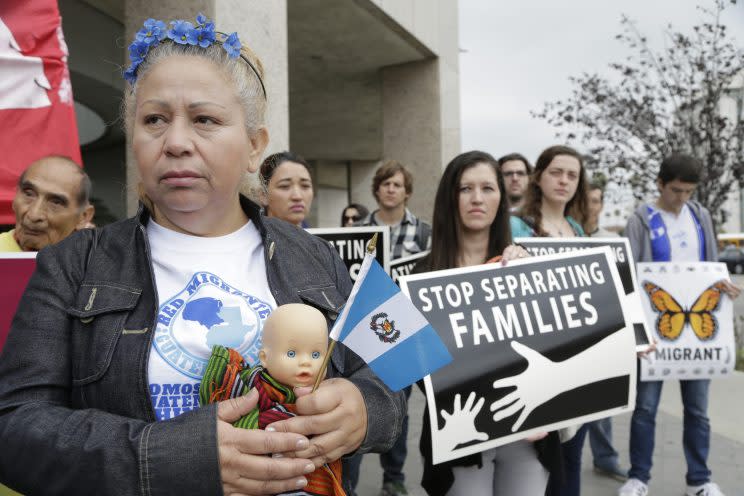Parties’ platforms open up wide gulf on immigration

CLEVELAND — Republican delegates voted for a platform that calls for less legal immigration, “special scrutiny” for immigrants from certain countries and a wall along the entire Southern border — a far tougher stance than the party has taken in years past.
The platform, adopted by the Republican National Committee’s Platform Committee Tuesday, also calls for rescinding President Obama’s executive action protecting around a million young people from deportation, calling it a “direct violation of federal law.”
The tough immigration stance is one of the few ways the Republican platform has changed to match the views of its nominee, Donald Trump, who is running on an “America First” platform that at one point included excluding Muslims from immigrating to the country.
Kris Kobach, a Platform Committee delegate and the secretary of state of Kansas, said he believes that the immigration portion of the platform reflects Trump’s views. Kobach, an anti-illegal-immigration activist, advised Mitt Romney on immigration in 2012 and is an informal adviser to Trump.
The Republican platform calls for a wall to “cover the entirety of the southern border” with Mexico to stop unauthorized crossings, a cornerstone of Trump’s campaign. But Kobach stopped short of inserting language asking Mexico to pay for the wall — which Trump has vowed to do — saying that was too specific to include.
Kobach also successfully added an amendment to ask for “special scrutiny” of immigrants entering the United States from “terror-sponsoring countries or from regions associated with Islamic terrorism.” The platform also says that current unemployment and underemployment in the country make it “indefensible” to “continue offering lawful permanent residence to more than one million foreign nationals every year.” That means, in effect, the Republican Party is asking for fewer green cards to be given to legal immigrants.

“The interests of American workers must be protected over the claims of foreign nationals seeking the same jobs,” the platform reads.
Meanwhile, Democrats are drafting one of the most pro-immigration platforms the party has seen, calling for a path to citizenship and access to health exchanges for people who immigrated to the U.S. illegally. Meanwhile, the Republican platform explicitly urges politicians to bar those immigrants from participating in government programs. The Democratic platform also calls for an expansion of Obama’s executive action to protect millions more immigrants from deportation.
“I think the parties are probably farther part now than they ever have been on immigration,” Kobach said.
“The two parties are going in opposite directions,” said Frank Sharry, executive director of the pro-immigration-reform group America’s Voice. “I think the gulf between the two parties has become a canyon.”
Republicans and Democrats weren’t always so far apart. In 1996, the Democratic platform urged a policy of cracking down on “criminal immigrants” and complained that the border was under-patrolled. “We cannot tolerate illegal immigration and we must stop it,” the platform read. In 2000, the Republican Party asked for “a total overhaul of the immigration system” to “meet the manpower needs of our expanding economy.” In 2004, its platform supported a guest worker program proposed by then-nominee George W. Bush but stopped short of endorsing comprehensive immigration reform.
It’s unclear what the political ramifications will be. Party platforms are largely symbolic documents, but in the case of immigration, they reflect the nominees fairly closely this time. In its autopsy of the 2012 election, the RNC wrote that it must embrace immigration reform or risk dying off. “If we do not, our Party’s appeal will continue to shrink to its core constituencies only,” it concluded. “We also believe that comprehensive immigration reform is consistent with Republican economic policies that promote job growth and opportunity for all.”


